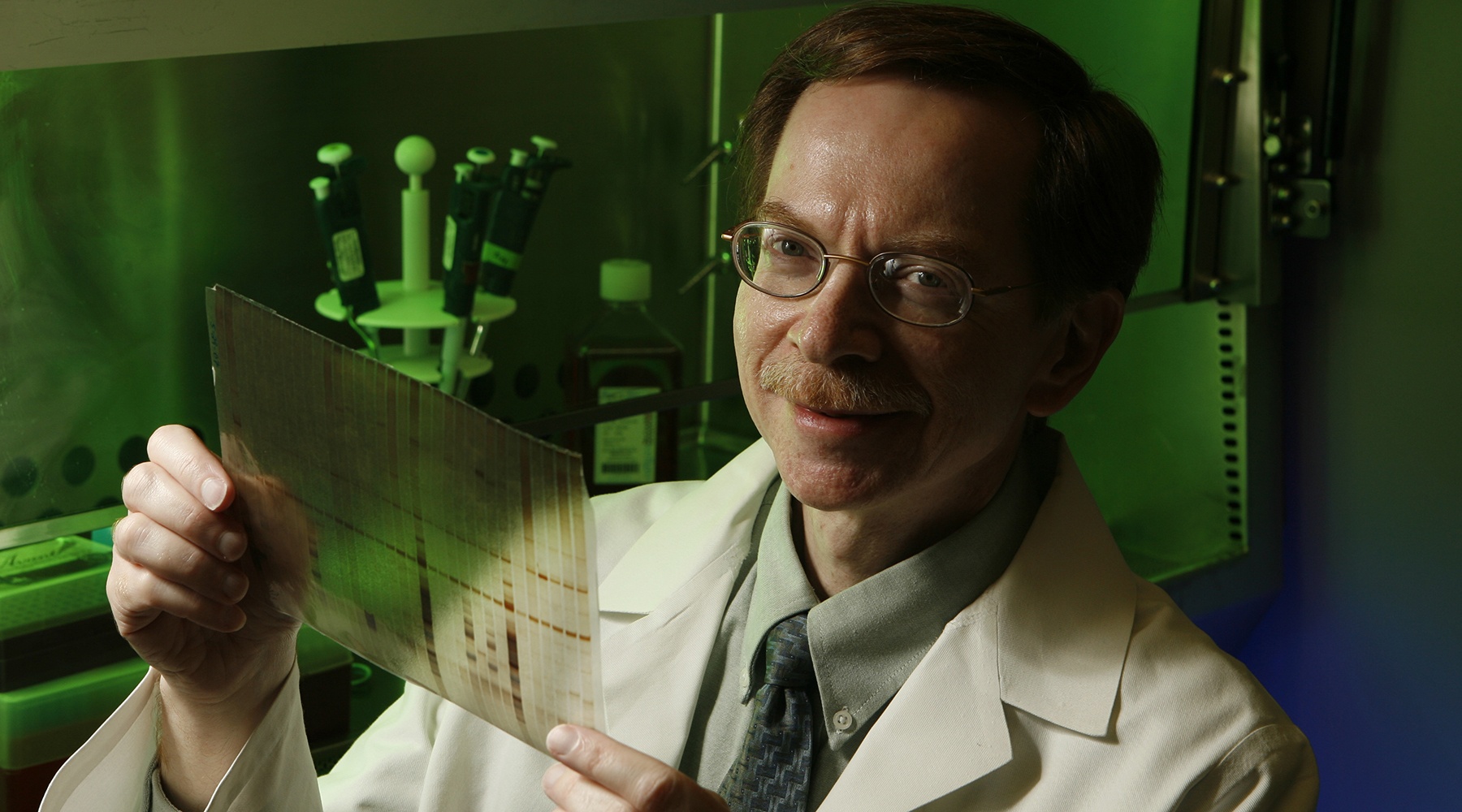Ira N. Targoff, M.D.
Assistant Professor
Arthritis & Clinical Immunology Research Program
Professor, Department of Medicine, University of Oklahoma Health Sciences Center
Staff Physician, U.S. Department of Veterans Affairs Medical Center, Oklahoma City
My 101
In the immune system, antibodies fight infections and disease to keep us healthy. But sometimes antibodies get confused and become “autoantibodies,” attacking human tissue instead of fighting illnesses.
In my lab, we are focused on autoantibodies that are associated with muscle inflammation, also called myositis, and on the antigens that these autoantibodies react with. Myositis is much worse than just having sore muscles after a hard workout. The disease can cause extreme weakness that makes normal tasks almost impossible for patients. Almost everything we do involves muscles, including swallowing, walking and even holding objects. So while some patients with myositis may look completely normal, the disease can severely limit their ability to live a normal life.
By developing a better understanding of these and other autoantibodies and antigens, we’ll be better able to diagnose certain autoimmune diseases, which is necessary to provide the best available treatment and discover better treatments.
Research
My laboratory focuses on the study of the autoantibodies associated with polymyositis and dermatomyositis, autoimmune diseases that lead to muscle inflammation (myositis). Several specific autoantibodies have been identified in the serum of patients with myositis. Each individual autoantibody is found only in a small proportion of patients, but evidence of autoantibodies can be found by screening tests in over 80 percent. Some of the autoantibodies occur almost exclusively in patients with myositis, although others often occur in patients with other autoimmune conditions. Many of the autoantibodies are associated with particular clinical subgroups.
Much of our work has involved the characterization of these myositis-related autoantibodies, and the study of the antigens involved. We have used a wide variety of techniques to identify the autoantibodies. Immunoprecipitation has been particularly useful and remains the most sensitive and specific test for detection of several of them. We also use modified immunoprecipitation-blotting techniques for specific identification and confirmation. For biochemical analysis of the antigens, we have used molecular cloning and sequencing and microsequencing of purified antigen proteins. We have analyzed specific epitopes using expressed recombinant fragments and epitope-scanning techniques. In collaboration with several other groups, we have studied the clinical features associated with the autoantibodies.
These autoantibodies are valuable clinical tools for diagnosis and classification, and in order to take full advantage of this, it is important to be able to recognize all of the significant antibodies, to have optimal methods for their detection and to have a full knowledge of their clinical implications. We are working toward achieving this goal. We are characterizing recently discovered autoantibodies and studying their clinical associations, one of which, seen in certain forms of dermatomyositis, was described by our laboratory. Epitope reactivity of some of the antibodies is unknown and may have important implications for their significance. In addition, we are particularly interested in the reason these autoantibodies develop and their role in the pathogenesis of these conditions.
Brief CV
Education
B.S., City University of New York (Brooklyn College) (magna cum laude), 1971
M.D., Albert Einstein College of Medicine, Bronx, New York, 1975
Honors and Awards
The Merrick Award for Outstanding Research
Other Activities
Proctored Presbyterian Health Foundation Scholar, 1988-1990
Proctored Sir Alexander Fleming Scholar Program, 1985-1993
Memberships
American College of Physicians
American College of Rheumatology
American Federation of Medical Research
American Association of Immunologists
American Association for the Advancement of Science
Sigma Xi
Phi Beta Kappa
Joined OMRF scientific staff in 1993
Publications
Recent Publications
Sherman MA, Noroozi Farhadi P, Pak K, Trieu EP, Sarkar K, Targoff IN, Neely ML, Mammen AL, Rider LG, Childhood Myositis Heterogeneity Collaborative Study Group. Myositis-associated autoantibodies in juvenile myositis are associated with refractory disease and mortality. Arthritis Rheumatol, 2024 January, PMID: 38272842, PMCID: PMC11136598
Kim H, Gunter-Rahman F, McGrath JA, Lee E, de Jesus AA, Targoff IN, Huang Y, O'Hanlon TP, Tsai WL, Gadina M, Miller FW, Goldbach-Mansky R, Rider LG. Expression of interferon-regulated genes in juvenile dermatomyositis versus Mendelian autoinflammatory interferonopathies. Arthritis Res Ther 22:69, 2020 April, PMID: 32252809, PMCID: PMC7137415
Yeker RM, Pinal-Fernandez I, Kishi T, Pak K, Targoff IN, Miller FW, Rider LG, Mammen AL, Childhood Myositis Heterogeneity Collaborative Study Group. Anti-NT5C1A autoantibodies are associated with more severe disease in patients with juvenile myositis. Ann Rheum Dis 77:714-719, 2018 May, PMID: 29363513, PMCID: PMC5898976
Selected Publications
Rider LG, Wu L, Mamyrova G, Targoff IN, Miller FW, Childhood Myositis Heterogeneity Collaborative Study Group. Environmental factors preceding illness onset differ in phenotypes of the juvenile idiopathic inflammatory myopathies. Rheumatology (Oxford) 49:2381-2390, 2010. PMID: 20802007 PMCID: PMC2981509
Trieu EP, Gross JK, Targoff IN. Immunoprecipitation-Western blot for proteins of low abundance. Methods Mol Biol 536:259-275, 2009. PMID: 19378065
Targoff IN. Autoantibodies and their significance in myositis. Curr Rheumatol Rep 10:333-340, 2008. PMID: 18662515
Koenig M, Fritzler MJ, Targoff IN, Troyanov Y, Senecal JL. Heterogeneity of autoantibodies in 100 patients with autoimmune myositis: insights into clinical features and outcomes. Arthritis Res Ther 9:R78, 2007. PMID: 17688695 PMCID: PMC2206383
Targoff IN, Mamyrova G, Trieu EP, Perurena O, Koneru B, O'Hanlon TP, Miller FW, Rider LG. A novel autoantibody to a 155-kd protein is associated with dermatomyositis. Arthritis Rheum 54:3682-3689, 2006. PMID: 17075819
Troyanov Y, Targoff IN, Tremblay JL, Goulet JR, Raymond Y, Senecal JL. Novel classification of idiopathic inflammatory myopathies based on overlap syndrome features and autoantibodies: analysis of 100 French Canadian patients. Medicine (Baltimore) 84:231-249, 2005. PMID: 16010208
Contact
Arthritis & Clinical Immunology Research Program, MS 38
Oklahoma Medical Research Foundation
825 N.E. 13th Street
Oklahoma City, OK 73104
Phone: (405) 271-7395
Fax: (405) 271-4119
E-mail: Ira-Targoff@omrf.org
For media inquiries, please contact OMRF’s Office of Public Affairs at news@omrf.org.
Lab Staff
Dawn Updike
Research Assistant IV
Edward Trieu
Senior Technical Specialist
Craig Wasson
Senior Technical Specialist
Randi Thompson
Research Technician IV
Lin Wang
Research Technician III





